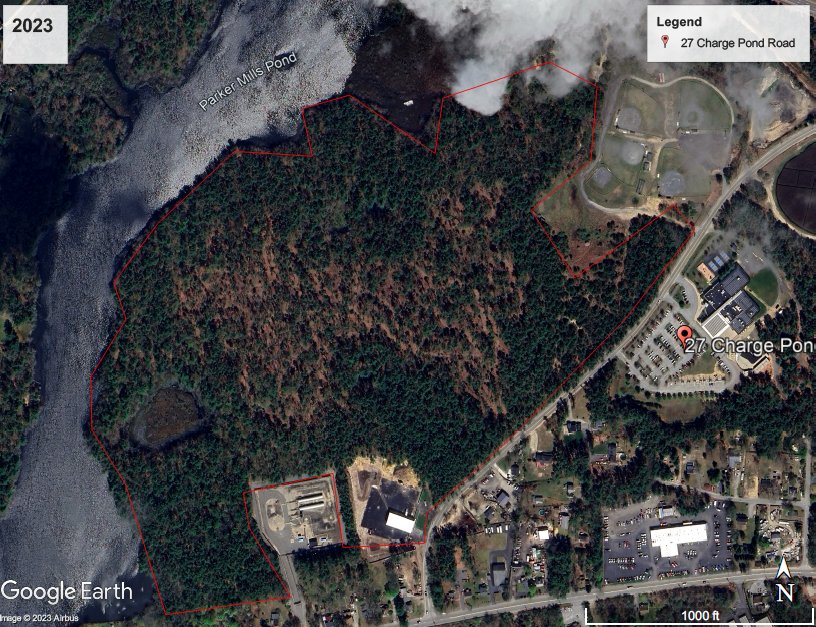
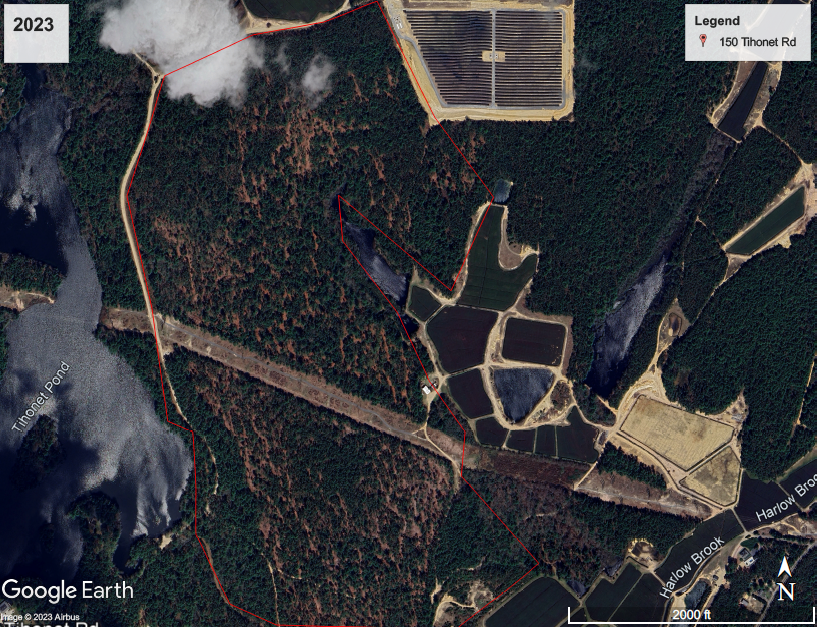
- Citizens’ Groups extensively write to Planning Board to deny the permit extensions and urge Wareham to further study the safety and impacts of extensive solar installations within the Town.
- Part of vast complex of sand mining and solar complexes throughout Wareham and Carver that have devastated biodiversity, wetlands and forests, AD Makepeace Co’s proposed solar installations at 27 Charge Pond Road and 150 Tihonet Road would have cut down an additional 111 acres of Pine Barrens forest.
June 10, 2024: The Wareham Planning Board denied site plan approval and special permit extensions for two solar proposals, one at 27 Charge Pond Road and the other at 150 Tihonet Road. Although the Board was not required to give a reason, they have previously expressed concerns with the safety of battery energy storage systems on site, the fact that the approvals are four years old already, and the fact that, if the approvals are extended, the Board will not have a chance to review the projects again, even though we are still possibly several years away from a project build-out.
Background – Planning Board and Citizens’ Actions:
January 8, 2024: The Wareham Planning Board contracted with safety expert Milosh Puchovsky to study the hazards associated with battery energy storage systems (BESS) and the applicable safety regulations. However, Mr. Puchovsky was unable to evaluate the safety and effectiveness of the applications for solar at 27 Charge Pond Road and 150 Tihonet Road as they were lacking in key information such as equipment specifications. The applicant said that equipment, and associated safety ratings, would not be identified until the projects were closer to implementation, but they would provide that information before breaking ground.
After hearing the results of Mr. Puchovsky’s initial response, and the fact that he was unable to perform a complete review of the projects due to lack of specifications, the Planning Board was unwilling to move forward on the extensions without the safety evaluation in place.
Monday, June 26, 2023: The Wareham Planning Board met on whether to deny the permit extension requests from Borrego Solar for the two destructive ground-mounted solar projects. A Citizens’ Group has submitted a letter to the Planning Board (below), stating all the reasons the permit extensions should be denied.
Previously the Board requested more information on decommissioning, disposal costs for the solar panels, and the Town’s liability if Borrego/New Leaf walk away at the end of the lease. The Board asked the applicant to up the decommissioning cash bond to $2.2M. In December 2022, the Planning Board also raised serious concerns about the applicant’s irresponsible plans for decommissioning, as covered by the Wareham Week.
We are telling the Planning Board that the extensions should be denied and Borrego (now New Leaf) should reapply for the permits.
So much has changed since the site plans were approved in 2020.
- Wareham residents voted to change to the Wareham solar siting bylaw to make it more protective of forests, natural resources, and wildlife habitat
- There have been recent developments regarding state solar policy siting and criteria
- A new increased awareness of the potential risks associated with Battery Energy Storage Systems (BESS)
- New criteria adopted by the Wareham Fire Department in December 2022 regarding BESS
- Awareness of the cumulative impact of all of the deforestation/solar development in Wareham since 2020
- New information about the costs of decommissioning
The Planning Board approvals in 2020 were flawed in numerous ways. They did not adequately address impacts to Wareham’s water quality and wetlands. An expert report by Patrick C. Garner Co., Inc., dated May 8, 2021, identified two major defects in the wetlands applications for the solar arrays at 150 Tihonet Road and 27 Charge Pond Road. The precipitation data submitted to the Wareham Conservation Commission was climatologically obsolete. The applicant used 60-year old climatological data in the calculations of the stormwater retention requirements, rather than real-time precipitation data used by conscientious engineering firms. This means the stormwater systems approved by the Conservation Commission in 2020 are undersized by 20%. The report also documents that potential vernal pools are present on both sites, including four potential vernal pools at 27 Charge Pond Road and one potential vernal pool on 150 Tihonet Road. At least one of the vernal pools was biologically rich enough to certify; however the Wareham Planning Board approved the site plans without an Order of Conditions from the Conservation Commission, so they did not have this information.
Background – Improperly-Sited Solar’s Impact on the Natural Environment
We need both our forests and renewable energy in order to fight climate change.
- A 2023 study by Mass Audubon and Harvard Forest concludes that we can meet our solar needs without clear-cutting our forests for projects like these.
- A 2021 study shows that these 3 projects are a climate and biodiversity disaster – not a solution!
- Solar belongs on rooftops and parking lots, not in our forests.
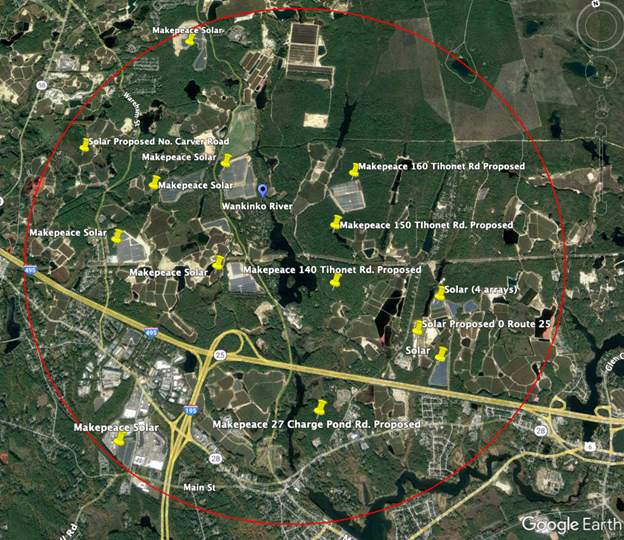
The area surrounding the proposed sites has already seen intense solar development.
Wareham has already lost over 300 acres of forest to solar development; it’s time for the Town put a stop to new solar projects that destroy forests in the name of clean energy. Science shows that preserving our forests along with their intact ecosystems and biodiversity are critical to addressing the climate crisis. Forests combat the effects of climate change by providing cooler temperatures, mitigating flooding, and purifying the air. Undeveloped forested land is crucial to sequestering carbon; in fact, according to the Massachusetts Decarbonization Roadmap, forests are the only proven technology that Massachusetts has for sequestering carbon. The pine barrens forests of Wareham must be preserved. Since 2000, it appears that the area has one of the highest rates of forest loss since 2000 in the entire state.
There has been no analysis of the impact on the Plymouth-Carver Sole Source Aquifer resulting from the deforestation from solar arrays in Wareham and Carver. The Plymouth-Carver Sole Source Aquifer is comprised of well-sorted, coarse grained silica sand, and water flows freely through it. There is very little relative attenuation time from when run-off or precipitation penetrates the ground surface to when it reaches the groundwater table. In fact, the water table is visible at the ground surface in Wareham’s ponds and rivers. Therefore, contaminants can be rapidly introduced into the aquifer system from a number of sources.
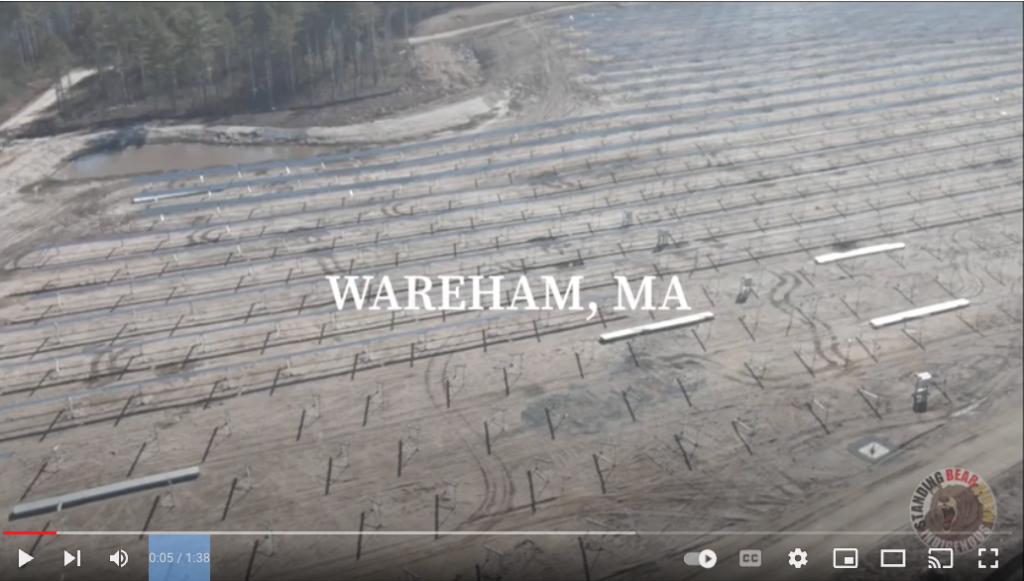
Watch You Tube videos of the impacts of solar development in Wareham here.
Growing Solar, Protecting Nature, a 2023 joint study by Mass Audubon and Harvard Forest, concludes that by protecting the most valuable natural and working lands from development, such as the forests at 27 Charge Pond Road and 150 Tihonet Road, Massachusetts could produce enough solar energy to meet our greenhouse gas emission reduction goals, while preserving 76% more forest carbon than our current trajectory would predict, and protecting nearly 100% of our remaining essential wildlife habitat and prime farmland.
Solar energy is a crucial component of our sustainable energy future. Unfortunately, the financial subsidies for solar have created unfortunate outcomes in land-use planning. Developers are taking the easy route and cutting down forests for solar instead of doing the hard work of planning solar on our built environment. Several groups, including the Wareham Land Trust issued a statement on solar siting in October 2021.
Also, an EPA program called Re-Powering America’s Land aims to provide information and resources to solar developers and municipalities on the benefits of and considerations associated with siting solar development on contaminated land and landfills. The EPA is recognizing the need to conserve open space in the fight against climate change and providing resources to municipalities expedited the process associated with putting solar in previously developed land. It is possible to have solar power generation without cutting down forests, if planned and sited properly.

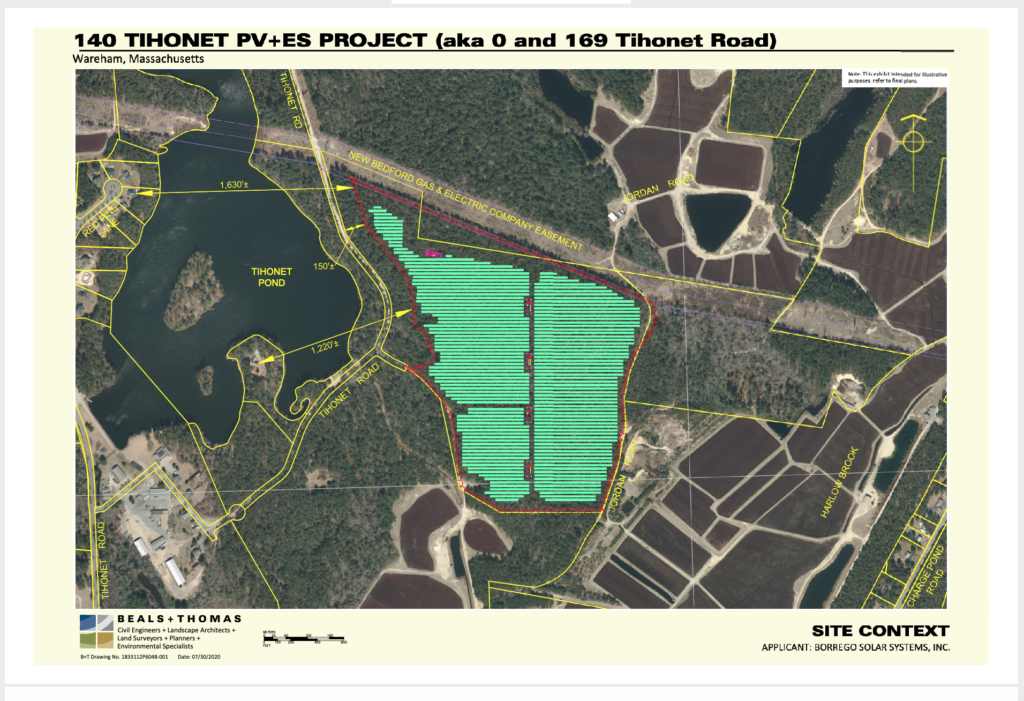
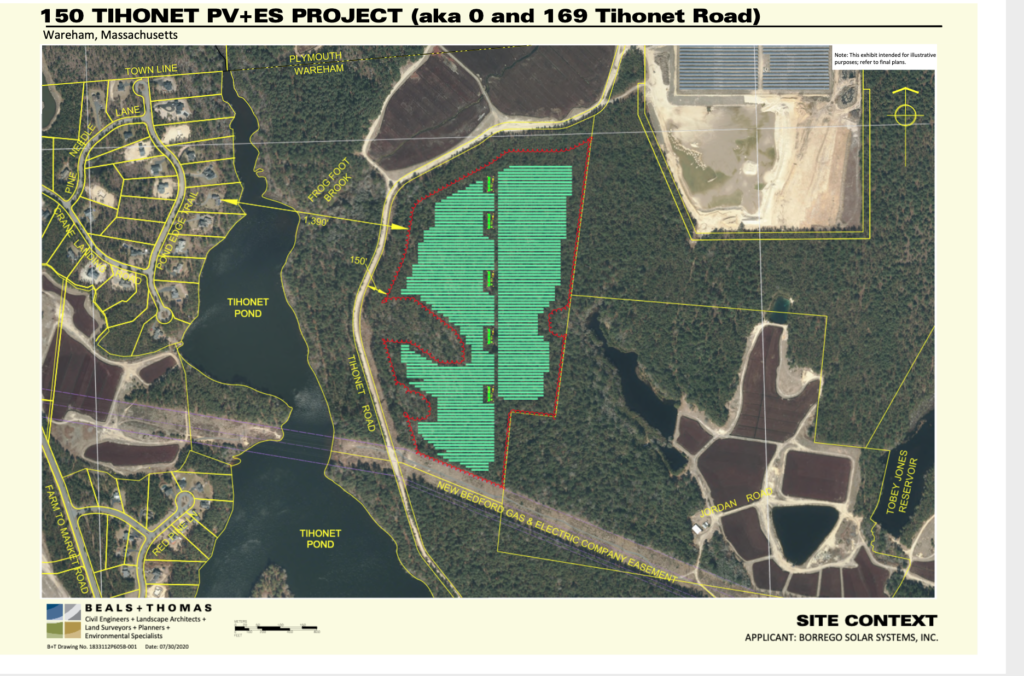
This is not about renewable energy – it is about saving our forests! State solar subsidies are providing financial incentives for large landowners to clearcut and lease their land, and we have to reverse course before it is too late!
For more information on what you have read, or for a myriad of additional reasons why these projects should not be approved, please contact Community Land and Water Coalition.

I have a lot of reading here & I hope to attend the meeting in Wareham. Why aren’t the municipal buildings inatalling solar? New elementary school framed to accept the weight. I once heard a comment that placing solar on buildings will not work because Wareham would have too many credits. Does that mean the town is buying credits instead of producing their own energy, maybe even selling their credits? (As I do with my solar panels) Bet there is is money under the table!